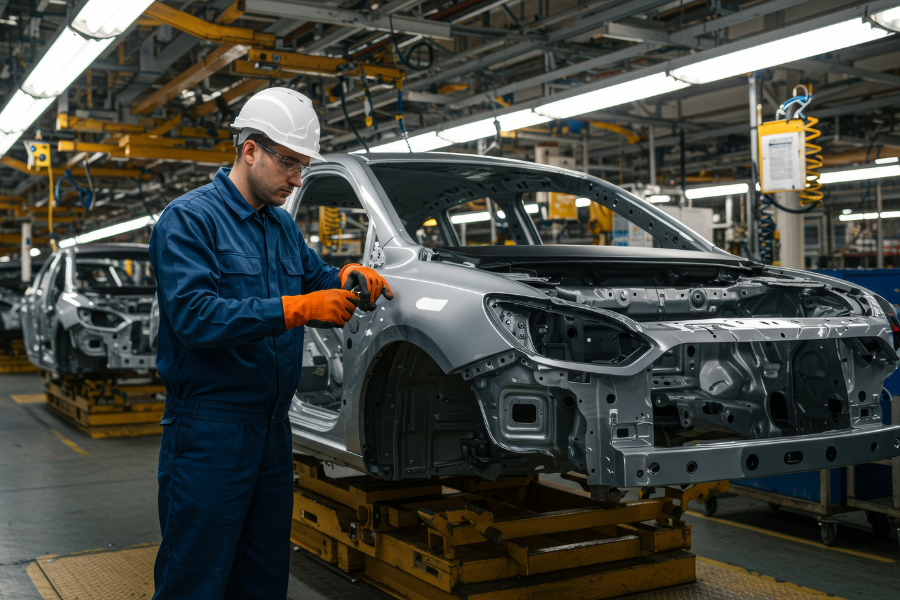
Want to Future-Proof Your Career? Consider a Skilled Trade.
“With over a million unfilled trade jobs and salaries on the rise, skilled tradespersons are not just in demand. They’re the backbone of America’s future.” That’s the stance Jack Kelly, senior contributor at Forbes, takes in an article that definitely rings true for anyone in the skilled trades.
For office workers who are anxious about AI displacement, skilled trades offer new possibilities to “future-proof” their careers. In fact, the last few years have seen serious upticks in trade school enrollment.
If you’re either starting your career or interested in changing directions, skilled trades could be a better option—especially since they don’t come with mountains of student debt. Here are some of the reasons why a skilled trades career is a smarter move and the types of roles that are most in-demand in 2025.
Why skilled trades are a future-proof career path
Though tech-driven careers and knowledge worker jobs have been the focus of education since the 1950s, there has been a reversal in the last few years. Leaps forward in generative AI and large language models (LLMs) have made it easier to automate office work.
Companies across the board, from IBM to Microsoft to Autodesk to Duolingo are all cutting their workforces, pointing to AI as their major reason. Human workers won’t fully disappear from IT and corporate roles, but the number of opportunities out there will shrink.
Skilled trades, on the other hand, are much harder for AI to take over. There are a number of reasons why:
- Currently, AIs are far more effective in virtual environments than physical ones, limiting their capabilities in reality
- Skilled trades often require precise physical manipulation, adaptability to environments, and hand-eye coordination. Robots still struggle with all three.
- AIs struggle to diagnose unique, real-world problems that don’t fall within standardized patterns
- AIs can’t grasp a holistic understanding of complex, multi-step processes unless they have specific sensors to feed them data.
- Maintenance and troubleshooting—someone has to still manage, configure, and repair robotic equipment when it fails
For all these reasons, skilled trades are far more future-proof than IT or knowledge work. So, if you’re interested in a career path that’s likely to be stable for decades to come, then a skilled trade may be a good fit.
The skilled trade deficit & why it matters
There’s also a higher demand for skilled trades now than before. Studies indicate that:
- 2.1 million skilled trades jobs are projected to go unfilled by 2030
- 40% of skilled tradespeople are expected to retire in the next decade
In other words, demand is high, and supply is low. These dynamics are perfect if you want ongoing job security. Electricians, HVAC technicians, plumbers, welders, construction managers, and other skilled trades positions offer significant security and competitive pay.
How much can you make from skilled trades?
Speaking of pay: who doesn’t want to make more of it? So how much can you realistically make in a skilled trade career? The exact salary is going to vary by region, local cost of living, and your own skill and experience level. However, here are a few high-level stats to consider:
- Average wage: $26.25 per hour, which translates to about $54,604 per year
- Typical range: $18.99 (25th percentile) to $34.38 (75th percentile) per hour
- Top earners: 45.19+ per hour or more, and even as high as $90,000 or even $100,000+ in some trades
If you’re looking for the highest paying trades, electricians and plumbers take the cake, with top earners in these fields making well over $100,000 per year.
The advantage of skilled trades is much more than just the hourly figure, however. Trade programs are generally much less expensive than a bachelor’s degree. That means it’s easier to graduate with little to no student debt. On top of that, many programs offer paid apprenticeships, which enables you to “earn while you learn” and gets you 3-4 years’ more experience (and earnings) over your college-going peers.
Most in-demand skilled trade roles
Skilled trades cover a wide range of job possibilities. Here are some of the positions that are in highest demand in 2025, as well as the certifications you’ll need for each.
Electricians
With the rise of smart homes, EV charging stations, and renewable energy projects, electricians are seeing a spike in demand. In some areas, there’s a 6% job growth rate.
Necessary certifications:
- Journeyman Electrician License
- Master Electrician License (for those seeking to supervise)
- OSHA 10/30-Hour Construction Safety Certification
- NEC (National Electrical Code) Certification
HVAC technicians
Homes always needed to be heated and cooled. Especially in areas where homeowners and business owners have installed more complex energy efficient systems, there will always be a high demand for HVAC technicians.
Necessary certifications:
- EPA Section 608 Certification
- NATE (North American Technician Excellence) Certification
- HVAC Excellence Certification
- OSHA 10/30-Hour Certification
Plumbers
Few things muck up the works of ordinary life quite plumbing problems. Whether it’s a leak or blockage, people need plumbers who can get water supply and waste management systems flowing as designed. It’s a dirty job, but someone has to do it.
Necessary certifications:
- Journeyman Plumber License
- Master Plumber License (for project leads)
- OSHA 10/30-Hour Certification: For safety compliance on job sites.
- Backflow Prevention Certification
Welders
As governments and companies continue to invest in infrastructure and manufacturing, skilled welders will always be in demand. This is especially true for those skilled in advanced welding techniques like laser beam welding, friction stir welding, electron beam welding, automated welding, and more.
Necessary certifications:
- AWS (American Welding Society) Certification
- OSHA 10/30-Hour Certification
- ASME (American Society of Mechanical Engineers) Certification
- API (American Petroleum Institute) Certification
Next steps to pursuing a skilled trade career in 2025
So, let’s say this article has convinced you to pursue a skilled trade career in 2025. What’s next? There are a lot of steps to take along the way, and it’s helpful to have a trusted partner by your side.
If you’re looking to enter a trade or just need advice on what your next step should be, reach out to us. We’re happy to serve our community.






















